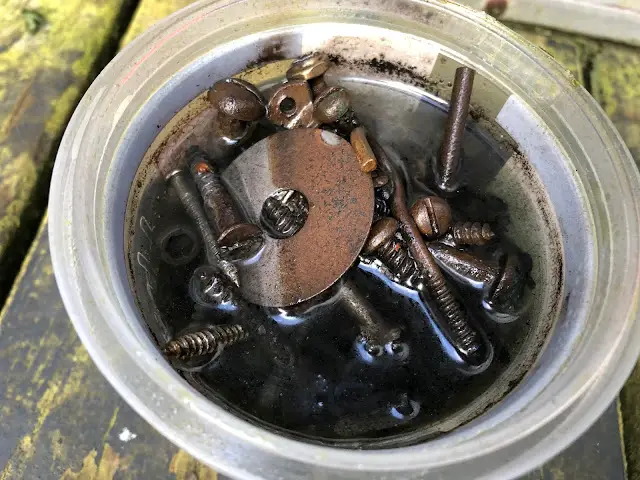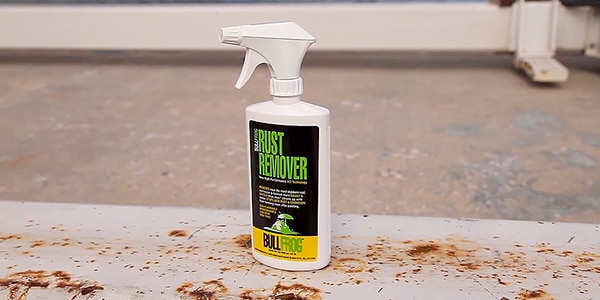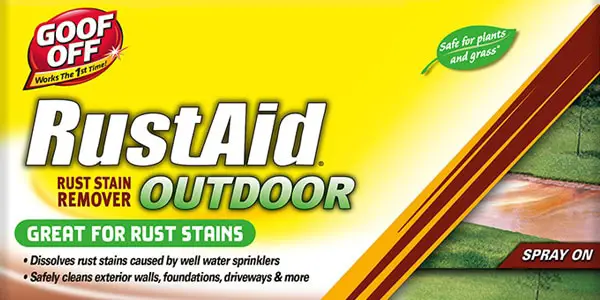Acid is a common household item used for various cleaning purposes. When it comes to removing rust, there are several options available, but not all acids are created equal. In this article, we will discuss the best acids for rust removal, their strengths and weaknesses, and how to use them safely and effectively.
One of the most commonly used acids for rust removal is White Vinegar. It is a mild acid that is safe to use and can effectively dissolve rust without causing damage to the metal surface. To use white vinegar, simply soak the rusted item in a bowl of vinegar for a few hours or overnight, then scrub away the rust with a wire brush. White vinegar can also be mixed with baking soda to create a stronger cleaning solution.
Another effective rust remover is Phosphoric Acid, commonly found in rust converters. It works by converting the rust into a stable, paintable surface. To use phosphoric acid, simply apply the rust converter to the surface and allow it to sit for the recommended time. Then, rinse the surface with water and allow it to dry completely before painting or storing the item.
Remember to always wear gloves and protective eyewear when working with acidic solutions, and be sure to follow the manufacturer’s instructions carefully. By selecting the best acid for your rust removal needs, you can effectively remove rust and restore your metal items to their original beauty.

Best Acid for Rust Removal Overview
Let me tell you, there are some really great options out there for removing rust and restoring metal surfaces to their former glory. Of course, every metal and every rust situation is different, so there isn’t a one-size-fits-all answer. However, I can definitely give you my top picks based on my experience and research.
First on my list is White Vinegar. This is a fantastic option for mild rust removal and can be found in most kitchens. It’s safe, non-toxic, and works like a charm! Just soak the rusted item in a bowl of vinegar for a few hours, and the acid will dissolve the rust away. If the rust is particularly stubborn, you can even mix baking soda with the vinegar for added power.
Next up is Phosphoric Acid, which you’ll often find in rust converters. This acid is a bit stronger than vinegar, but it still safe to use. The amazing thing about phosphoric acid is that it not only removes rust, but it also converts the rust into a stable, paintable surface. So, not only are you restoring the metal, but you’re also preparing it for a fresh coat of paint.
Last but not least, I have to give a shout-out to Citric Acid. This is another safe and non-toxic option that works great on light rust. The bonus with citric acid is that it’s a natural cleaner, so it’s a great choice for those who are looking for environmentally friendly rust removal options.
Overall, I think the best acid for rust removal depends on the type of rust and the metal being treated. But with options like these, you really can’t go wrong. Just be sure to always wear gloves and protective eyewear, and follow the manufacturer’s instructions, and you’ll be on your way to a rust-free metal surface!

Best acid for rust removal Ingredients and Comparison table
White Vinegar: White vinegar is a mild acid that is safe to use and can effectively dissolve rust. It’s made from diluted ethanol and is often found in most households. To use white vinegar, simply soak the rusted item in a bowl of vinegar for a few hours or overnight, then scrub away the rust with a wire brush. White vinegar can also be mixed with baking soda to create a stronger cleaning solution.
Phosphoric Acid: Phosphoric acid is commonly found in rust converters and is a bit stronger than white vinegar. It works by converting the rust into a stable, paintable surface. To use phosphoric acid, simply apply the rust converter to the surface and allow it to sit for the recommended time. Then, rinse the surface with water and allow it to dry completely before painting or storing the item.
Citric Acid: Citric acid is another safe and non-toxic option for removing rust. It’s a natural cleaner that is derived from citrus fruits and works great on light rust. To use citric acid, simply mix the powder with water to form a solution, then soak the rusted item for a few hours before scrubbing the rust away.
Comparison Table:
| Acid | Strength | Safety | Availability |
|---|---|---|---|
| White Vinegar | Mild | Safe | Common |
| Phosphoric Acid | Strong | Safe | Found in rust converters |
| Citric Acid | Mild | Safe | Natural cleaner |
As you can see, each acid has its own strengths and weaknesses, and the best acid for rust removal depends on the type of rust and the metal being treated. White vinegar is a great all-around option for mild rust removal, while phosphoric acid is a bit stronger and converts the rust into a paintable surface. And for those who are looking for an environmentally friendly option, citric acid is a great choice.
Equipment to work with best acid for rust removal
| Equipment | Purpose |
|---|---|
| Protective gloves | To protect your hands from the acid |
| Protective eyewear | To protect your eyes from splashes |
| Wire brush | To scrub away the rust after soaking in the acid |
| Bowl or container | To hold the acid and the rusted item |
| Rust converter (for Phosphoric Acid) | To apply the phosphoric acid to the surface |
| Baking soda (for White Vinegar) | To create a stronger cleaning solution |
| Citric acid powder (for Citric Acid) | To mix with water to form a solution |

These are the basic pieces of equipment you’ll need to work with the best acids for rust removal. Of course, depending on the size of the rusted item and the type of rust, you may need additional equipment, such as a spray bottle or large container. But with these essentials on hand, you’ll be well on your way to removing rust and restoring metal surfaces!
A step by step instruction on how to make best acid for rust removal
- Gather the supplies: You’ll need white vinegar, baking soda, a bowl or container, a wire brush, and protective gloves and eyewear.
- Prepare the solution: Mix equal parts of white vinegar and baking soda in a bowl or container to form a paste. Stir the solution until the baking soda has dissolved completely.
- Apply the solution: Soak the rusted item in the solution for several hours or overnight. The longer you soak the item, the more time the solution will have to work on the rust.
- Scrub the rust: Once the item has soaked for long enough, use a wire brush to scrub away the rust. The rust should come off relatively easily.
- Rinse the item: After scrubbing, rinse the item thoroughly with water to remove any residue from the solution.
- Dry the item: Allow the item to dry completely before storing or painting.
And that’s it! With this simple recipe, you can effectively remove rust using white vinegar and baking soda. If you’re dealing with heavy rust, you may need to repeat the process a few times, but the solution is safe and non-toxic, so you can use it as often as needed.
FAQ
What is the best acid for removing rust?
The best acid for removing rust depends on the type of rust and the metal being treated. White vinegar is a great all-around option for mild rust removal, while phosphoric acid is a bit stronger and converts the rust into a paintable surface. And for those who are looking for an environmentally friendly option, citric acid is a great choice.
Is it safe to use acids for rust removal?
When used properly, all three of the best acids for rust removal – white vinegar, phosphoric acid, and citric acid – are safe to use. However, it’s important to use protective gloves and eyewear to protect your skin and eyes from the acid.
How long do I need to soak the item in the acid solution?
The amount of time you need to soak the item in the acid solution depends on the type of rust and the strength of the acid. As a general rule, the longer you soak the item, the more time the acid will have to work on the rust. For mild rust, a few hours should be enough, while for heavy rust, you may need to soak the item overnight.
Can I paint over the rusted surface after removing the rust with acid?
Yes, you can paint over the rusted surface after removing the rust with acid. However, it’s important to make sure that the surface is completely dry and free of any residue from the acid solution before painting.
What type of wire brush should I use for scrubbing the rust?
A steel wire brush is the most effective for scrubbing the rust, but a brass wire brush will also work if you’re dealing with delicate surfaces that could be scratched by steel.



Leave a Reply